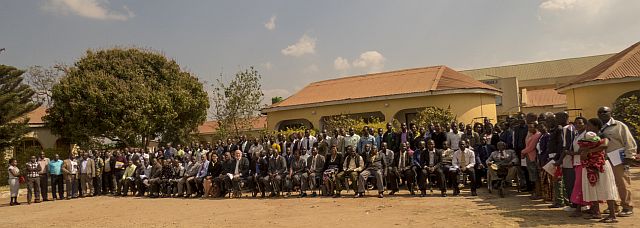
The UNESCO-UNEVOC International Centre: Who We Are | What We Do | Working With Us | Get in Touch
The UNEVOC Network: Learn About the Network | UNEVOC Network Directory
For Members: UNEVOC Centre Dashboard
Thematic Areas: Inclusion and Youth | Digital Transformation | Private Sector Engagement | SDGs and Greening TVET
Our Key Programmes & Projects: BILT: Bridging Innovation and Learning in TVET | Building TVET resilience | TVET Leadership Programme | WYSD: World Youth Skills Day
Past Activities: COVID-19 response | i-hubs project | TVET Global Forums | Virtual Conferences | YEM Knowledge Portal
Our Services & Resources: Publications | TVET Forum | TVET Country Profiles | TVETipedia Glossary | Innovative and Promising Practices | Toolkits for TVET Providers | Entrepreneurial Learning Guide
Events: Major TVET Events | UNEVOC Network News
August 16th – 25th, 2018
Lilongwe, Malawi

UNESCO-UNEVOC, in collaboration with the UNESCO Regional Office for Southern Africa![]() (ROSA), conducted a capacity development programme for the Managers of TEVET Institutions in Malawi. This training was undertaken as part of the European Union-funded Malawi Skills and Technical Education Programme
(ROSA), conducted a capacity development programme for the Managers of TEVET Institutions in Malawi. This training was undertaken as part of the European Union-funded Malawi Skills and Technical Education Programme![]() (STEP).
(STEP).
As the Malawi TEVET system moves towards a more decentralized structure with greater management autonomy for the public- and community-supported TEVET institutions, there is a pressing need to develop the managerial capacities of the leaders at these institutions. The STEP Programme aims to support and improve access to Technical, Entrepreneurial, and Vocational Education and Training (TEVET), review the governance and management of the TEVET system, and better equip TEVET teachers and trainers for an improved quality of delivery of TEVET in Malawi.
Together with UNESCO ROSA and STEP project partners, UNESCO-UNEVOC trained 127 Principals, Senior Management Officials, and Board Members from 45 TEVET Institutions. These included Technical Colleges, Community Technical Colleges, Trade Testing Centres, and Community Skills Development Centres.
Based on a Training Needs Analysis (TNA) conducted in the early part of 2018, experts developed programme modules that were responsive to the needs of the participants and aimed at enhancing the competencies of key management personnel. The modules provided guidance on the TEVET national framework, results-based management in TEVET, creating a quality-based culture, and setting up income-generating activities. Other topics covered included:
The programme implementation was coordinated on behalf of UNESCO-UNEVOC by Ms. Kenneth Barrientos - Programme Officer, in collaboration with Mr. Todini Marecha (UNESCO) and Mr. Arthur Shears (STEP). Representatives from two UNEVOC Centres: Malawi Polytechnic – University of Malawi, and the University of Cape Coast, Ghana, were also engaged in the delivery of the training modules. Other experts who provided input and guidance include Mr. Jens Liebe (UNESCO-UNEVOC) and representatives from FR Research Services Africa, Education Industry Exchange Africa, DAPP Mikolongwe Vocational School, Management Institute of Malawi (MIM), and Novo Habitus.
During the closing session, led by Mr. Joseph Mwandidya - Secretary for Labour, Youth, Sports, and Manpower Development of Malawi, and Mr. Aubrey Matemba – Director of the Department of Technical and Vocational Training, programme participants provided positive feedback and called for continued support in enacting progressive changes in the TEVET landscape in Malawi.